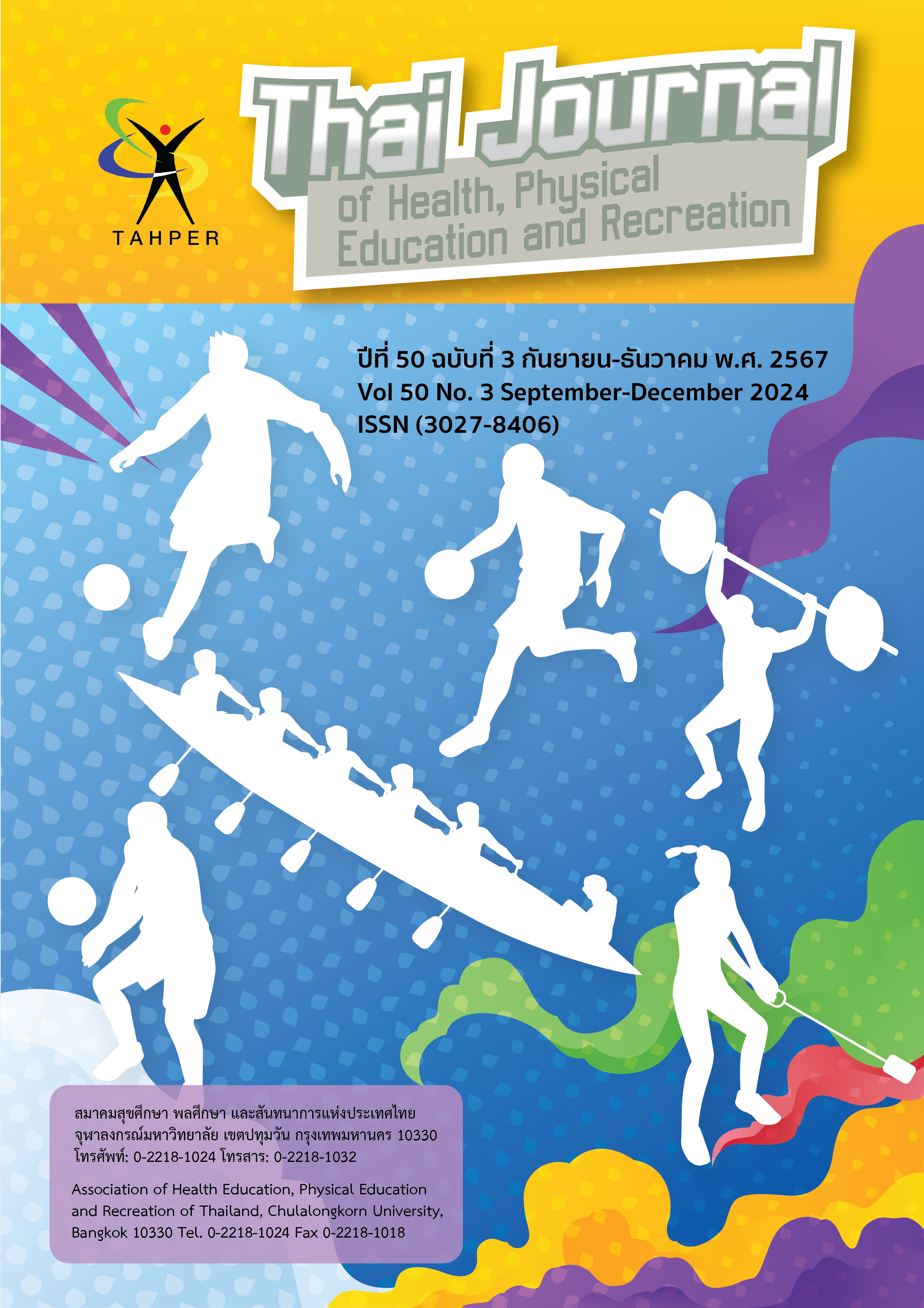Effects of Sex Education Instruction Program for Sexual Risk Behavior Prevention Among 5-6 grade Student at School in LumLukka District, Pathum Thani
Main Article Content
Abstract
The purpose of this research was to study the effect of a sex education program for preventing sexual risk behaviors among students in grades 5-6 at a school in Lam Luk Ka District, Pathum Thani using a quasi-experimental research model (Quasi - experimental research) with the main objectives to study the effect of the sex education program on preventing sexually risky behaviors of grade 5 - 6 students and to study knowledge, attitudes, skills in preventing sexual behaviors. by reviewing the relevant literature collecting data by using questionnaires Data were analyzed with descriptive statistics. The researcher took the original questionnaire and the sex education questionnaire to test the sample immediately. Then record the results of the exam as a score after studying (post-test). The results of the research concluded that Most students live with their parents. Sexual behaviors before participating in the sex education management program to prevent risky behaviors of sexual behavior have a good level of behavior. Knowledge of sexuality education after participating in the program average score increased. Comparing the difference after participating in the program, students had higher mean CSE knowledge levels. Percentage of correct answers to the CSE knowledge question Students answer questions correctly. The level of intention for the prevention of sexual intercourse behavior after participating in the program of intention for the prevention of sexual intercourse was at a good.
Article Details

This work is licensed under a Creative Commons Attribution-NonCommercial-NoDerivatives 4.0 International License.
Critical thinking in journals is the right of the author. The Association of Health Education, Physical Education and Recreation of Thailand is not always required, to create diversity in ideas and creativity.
ความคิด ข้อวิพากษ์ในวารสารเป้นสิทธิของผู้เขียน สมาคมสุขศึกษา พลศึกษา และสันทนาการแห่งประเทศไทยไม่จำเป็นต้องเห็นชอบด้วยเสมอไป เพื่อให้เกิดความหลากหลายในความคิดและความสร้างสรรค์
References
สำนักระบาดวิทยากรมควบคุมโรค. (2555). การเฝ้าระวังพฤติกรรมเสี่ยงที่สัมพันธ์กับการติดเชื้อเอชไอวี ปี 2555. สืบค้นเมื่อ 12 ตุลาคม 2565, สืบค้นจาก http://203.157.232.1/~cd- aids/BSS53.html.
กิตติพงศ์ พลเสน. (2548). ปัจจัยที่มีผลต่อการมีเพศสัมพันธ์ของนักเรียนระดับอาชีวศึกษาในพื้นที่ กรุงเทพมหานคร. วิทยานิพนธ์ปริญญาโท, จุฬาลงกรณ์มหาวิทยาลัย.
ฐิติมา เพชรสัมฤทธิ์, ไชยรัตน์ ปราณี, และ สุพัฒนา หอมบุปผา. (2557). ปัจจัยที่ส่งผลต่อพฤติกรรมสุขภาพ ทางเพศของนักเรียนระดับมัธยมศึกษาตอนต้นในจังหวัดนครสวรรค์. วารสารวิชาการเครือข่าย บัณฑิตศึกษา มหาวิทยาลัยราชภัฎภาคเหนือ, 4(6), 73-74.
ณิชาภัทร ปุ่นมีกิจ. (2559). ปัจจัยที่มีผลต่อพฤติกรรมเสี่ยงทางเพศของนักเรียนหญิงชั้นมัธยมศึกษาตอนต้น เมืองพัทยา. วิทยานิพนธ์ปริญญาโท, พยาบาลศาสตรมหาบัณฑิต (สาขาวิชาการพยาบาลเวชปฏิบัติ ชุมชน). คณะพยาบาลศาสตร์ มหาวิทยาลัยบูรพา.
ปัญญ์กรินทร์ หอยรัตน์ และปราโมทย์ วงศ์สวัสดิ์. (2560). วัยรุ่นไทยกับการมีเพศสัมพันธ์ก่อนวัยอันควร. วารสารวิทยาลัยพยาบาลพระปกเกล้า จันทบุรี, 28(2), 173-174.
วนิดา พันหงส์, กฤษณา วุฒิสินธ์, และธวัชวงศ์ชัย ไตรทิพย์. (2559). ปัจจัยที่มีความสัมพันธ์กับพฤติกรรมการ มีเพศสัมพันธ์ของวัยรุ่นในเขตอำเภอเมืองจังหวัดกาฬสินธุ์. วารสารวิชาการแพรวากาฬสินธุ์, 3(2), 56-57.
ศศิธร รุจนเวช. (2559). การดูแลสุขภาพวัยรุ่น: การส่งเสริมความผาสุกด้านจิตวิญญาณในการป้องกันพฤติกรรมการมีเพศสัมพันธ์ก่อนวัยอันควรในวัยรุ่นไทย. วารสารคณะพยาบาลศาสตร์ มหาวิทยาลัยบูรพา, 24(4), 24-26.
สุนิสา จันทร์แสง, อารีย์ ร้องจิก, ปุรินทร์ ศรีศศลักษณ์, ศรีสุรางค์ เคหะนาค และ ปัญจรัตน์ ไล้สุวรรณชาติ. (2562). ปัจจัยที่มีความสัมพันธ์กับพฤติกรรมเสี่ยงทางเพศจากการใช้อินเตอร์เน็ตของนักเรียน มัธยมศึกษาตอนต้นในอำเภอเมือง จังหวัดสุพรรณบุรี. วารสารพยาบาลกระทรวงสาธารณสุข, 30(2), 123-124.
Almeida, N., A. Teixeira, J., Garcia, N. Martins and C. Ramalho (2019). Effects of an Educational Intervention on Angolan Adolescents’ Knowledge of Human Reproduction: A Quasi - Experimental Study. International journal of environmental research and public health.
Rotz, D., B. Goesling, J. Manlove, K. Welti and C. Trenholm (2018). Impacts of a school - wide, peer - led approach to sexuality education: a matched comparison group design. Journal of School Health.
Scull, T. S., J. B. Kupersmidt, C. V. Malik, and E. M. Keefe (2018). Examining the efficacy of an mHealth media literacy education program for sexual health promotion in older adolescents attending community college. Journal of American College Health.
Suzuki, S., S. Takeda, T. Okano, and K. Kinoshita (2018). Recent strategies in perinatal mental health care in Japan. Hypertension Research in Pregnancy, HRP 2018-006.


